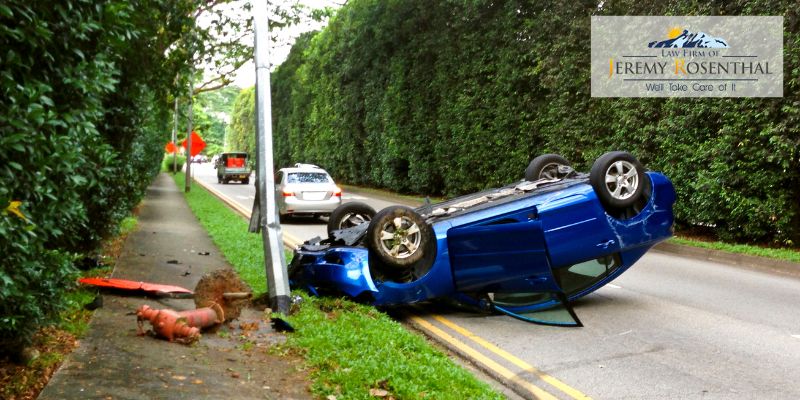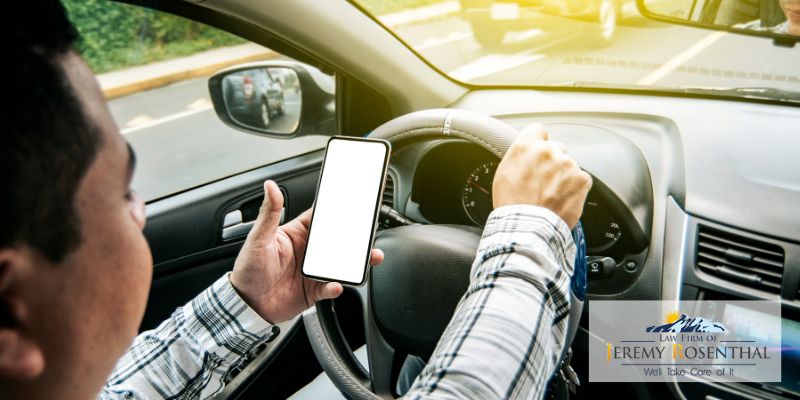One of the most frightening types of accident that you can be in is a rollover accident. Whether you car is flipping end over end or just onto its side, you, as well as the people in your car can suffer serious injuries or even death. Some vehicles are more prone to rolling over than others. Vehicles with a higher center of gravity like SUV’s, vans, and trucks are more likely than a sedan to rollover. For example, the Insurance Institute for Highway Safety stated that “[i]n 2014, 50 percent of SUV occupants killed in crashes were in vehicles that rolled over.” However, it is important to note that any vehicle can experience a rollover under the right circumstances.
Though these accidents occur only about 3% of the time, they are some of the most deadly. According to the National Highway Traffic Safety Administration (NHTSA), rollover accidents account for “nearly 35% of all deaths from passenger vehicle crashes.” In 2010, over 7,600 people were killed in rollover accidents. In addition, most rollover accidents that result in death are single-vehicle crashes. The NHTSA reported that these type of crashes accounted for “nearly 85% of all rollover-related fatalities.”
While they may not be the majority, other drivers, and defects in a vehicle can, and do, cause rollover accidents to happen. If you or a loved one has been injured in a Colorado rollover accident, you may be able to seek compensation from the party responsible for your injury via a Denver car accident law firm.

Tripped Rollovers Vs. Un-Tripped Rollovers
The NHTSA categorizes rollovers into two types: accidents that happen when a vehicle is tripped and accidents that happen when a vehicle in not tripped.
- Tripped Rollovers: The vast majority, 95%, of single-vehicle rollover accidents are tripped. Tripped accidents happen when “a vehicle leaves the roadway and slides sideways, digging its tires into soft soil or striking an object such as a curb or guardrail. The high tripping force applied to the tires in these situations can cause the vehicle to roll over.” There are several types of tripping accidents including soft soil accidents, guardrail accidents, and steep slope accidents. Soft soil accidents happen when a driver leaves the road and the tires dig into the soft soil in the ground, causing a rollover. Guardrail accidents happen when one side of the car rides up onto a guardrail, causing the car to rollover. Finally, steep slope accidents happen when a vehicle is on an incline that is too steep for it maintain stability. This could happen when a vehicle is off-roading or if a vehicle rides up an embankment on the side of the road.
- Un-Tripped Rollovers: This type of rollover accident is far less common. This type of accident happens when a vehicle does not “trip” over anything like the soil or a guardrail. Instead, “the frictional force between the tires and road surface can cause the vehicle to tip up and then roll over.” Un-tripped rollovers can also happen when a vehicle is top heavy and is trying to avoid something at a high rate of speed.
Causes Of Rollover Accidents
Rollover accidents can happen for any number of reasons. According to the NHTSA, “driver behavior plays a significant role in rollover crashes.” The agency’s website list the most common reasons that a car will rollover. They are as follows:
- Overcorrecting: Drivers who panic and overcorrect their cars are more likely to be in rollover accidents. This overcorrection can have dangerous consequences, especially at higher speeds because “lateral forces increase with speed and also with rapid changes of direction–for example, when a driver makes too sharp a turn one way and then overcorrects the other way. Those transitions can set up a pendulum effect, with larger and larger swings and an eventual loss of control.”
- Speeding: Driving too fast plays a role in rollover crashes. The NHTSA reports that “[s]ome 40% of fatal rollover crashes involved excessive speeding.” In addition, some 75% of rollover accidents took place in areas where the “posted speed limit was 55 miles per hour or higher.”
- Alcohol: Drinking and driving are never a good idea as alcohol can significantly impair your ability to operate your vehicle safely. Alcohol also plays a part in rollover crashes as “[n]early half of all fatal rollover crashes involve alcohol.”
- Location: About 75% of rollover accidents occur in rural areas. The NHTSA states that “[r]ural roads tend to be undivided and without barriers. They are thus more likely to be the scene of a fatal rollover.”
- Routine Driving: About 90% of all single-vehicle rollover crashes that end with a fatality happens during routine driving tasks. Routine driving tasks include things like going straight or going around a curve. This also points to driver behavior as a big part of what causes a rollover crash.
Driver Negligence If You Are A Passenger
As the information from the NHTSA shows, many rollover accidents are single-vehicle crashes that are caused because of some error on the driver’s part. If you are a passenger in a car where the driver was acting negligently and thus caused the car to rollover, you may be able to seek compensation from that driver for your injuries. In addition, if your loved one was killed in a rollover crash because the driver was negligent in some manner, you may be able to hold that driver responsible for the death of your loved one.

Other Drivers And Vehicle Defects
Though the vast majority of rollover accidents are single vehicle crashes, rollovers do occur for other reasons. These include the negligence of other drivers and a defect in the car.
- Other Drivers: Rollover accidents can also occur in an accident with another driver. For example, another driver could hit you and cause you to veer off the road and up onto an embankment and rollover. If another driver injures you, you could hold that driver liable for damages.
- Defective In A Car: An auto defect can also cause a rollover accident or make the injuries from a rollover worse. For example, if a tire is defective and the tire blows out, causing the car to flip, then the injured driver and passengers may be able to seek recourse from the tire manufacturer. Or if the seat belt is defective and fails during a rollover causing an occupant in the vehicle to suffer more extensive injuries than that person could seek compensation from the car manufacturer.
Contact An Attorney
If you or a loved one has been injured in a rollover accident because of the negligence of another or due to some defect in the car, you want an experienced and knowledgeable attorney on your side. Jeremy Rosenthal has been practicing personal injury law in Denver for over a decade. Contact his office today at (303) 825-2223, or click here to fill out the online form.
